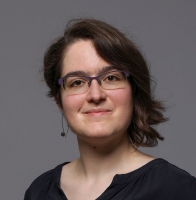Odjel za računarstvo
Odjel za računarstvo Hrvatske sekcije IEEE i Zavod za elektroniku, mikroelektroniku, računalne i inteligentne sustave (ZEMRIS) pozivaju Vas na predavanje
Technology & Economics: Real-time Ad Bidding and Personal Surveillance
koje će održati Natasa Milic-Frayling, School of Computer Science, University of Nottingham
u utorak 22. prosinca 2015. u 15:00 sati u Sivoj vijećnici Kongresnog centra Fakulteta elektrotehnike i računarstva Sveučilišta u Zagrebu, Unska 3.
Predvidivo trajanje predavanja s raspravom je 60 minuta.
Više o predavanju i o predavačici pročitajte u opširnijem sadržaju obavijesti.
Abstract
Internet advertisers reach millions of customers through practices that involve real time tracking of users’ online activities. The tracking is commonly conducted through browser cookies by third-party services who facilitate marketing campaigns and gather service analytics. By installing cookies on users’ computers, they track the users as they navigate from one site to another. Other trackers exploit shortcomings in the cache access control and apply cookie-less profiling.
At the same time, user applications, such as commonly used Internet browsers, reveal little or no information about the information flow between the devices and services. That leaves the consumers with no insight about the breadth of the digital footprints they leave while interacting with services and no understanding of how that data is exploited.
We outline a research agenda that investigates several aspects of this problem. That involves (1) characterizing the tracking ecosystem and the value exchange within it, (2) understanding of the users’ attitudes, behaviour, and awareness of the tracking practices, and (3) analysing the protocols and application design that contribute to the problem. We discuss the findings of several studies that investigate these issues. While they motivate us to think of alternatives to the privacy invading practices, they also urge deeper questions about the principles of design and comprehensibility of computing systems.
Speaker biography
Natasa Milic-Frayling is Professor and Chair of Data Science at the School of Computer Science, University of Nottingham. She has a long track record in computer science research and innovation. She specializes in inter-disciplinary research focussing on design, prototyping, and evaluation of information and communication systems.
Natasa received her undergraduate degree in Applied Mathematics from University of Zagreb, Croatia and Doctorate in Applied Mathematics from Carnegie Mellon University, Pittsburgh.
Until October 2015, Natasa worked as a Principal Researcher at Microsoft Research (MSR) in Cambridge, UK. After 17 years of leading Integrated System team, she has expaneded her remit to pursue academic work and engage with a broader ecosystem of businesses and public sector organizations.
Natasa is passionate about innovation in personal and social computing and promotes a dialogue between the ICT industry, consumers, and policy makers on the issues that arise from the adoption of digital technologies. Her current focus is on digital obsolescence and privacy respecting systems and applications. Following her invovlement in EU projects concerned with long term access to digital content (PLANETS and SCAPE EU projects), she is actively involved with the UNESCO PERSIST initative, working on the technical and economic solutions to sustain digital computiation and preserve digital heritage.
On these critical issues, Natasa collaborates with a number of academic organizations. She is a Visiting Professor at the Queen Mary University of London and the University College London and a Distinguished Visiting Scholar with MediaX at Stanford University. Recently she has been elected a member of the ACM Europe Council and joined the ACM Women Europe Executive Committee. She is on the Advisory Board for the Course in Entrepreneurship at the University of Cambridge and the Turing Gateway in Mathematics at the Isaac Newton Institute for Mathematical Sciences. She actively collaborates with researchers across disciplines and is involved in several EPSRC projects, including FAST, e-ARK, and the Science of Meaningful Consent.
Forum
>> / Sve diskusijske grupe / Kurikulum za srednje tehničke škole
Napomena:
* - oznaka za nove poruke

